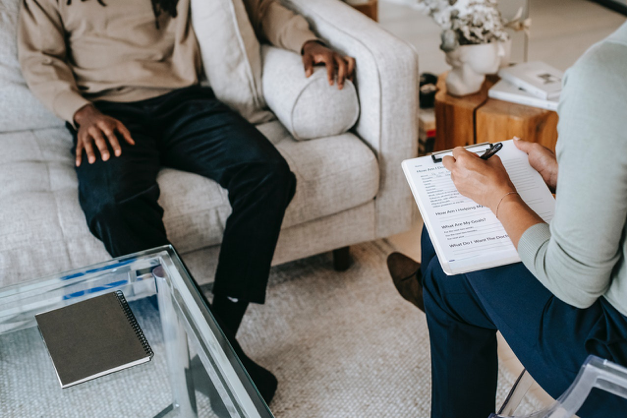The psychology of misophonia triggers a broad range of negative reactions in affected people. The triggers for this condition can be anything from rare or specific sounds to normal every day sounds like chewing, clicking, sniffling, etc.

It is important to note that there aren’t proper diagnostic criteria for misophonia. Besides, most people are generally unaware of this condition. If you experience disturbances in your daily life due to minor sounds and noises that are normal to everyone else, you may have misophonia. Keep in mind that we are not talking about fork on the plate or chalks on the board; these sounds are cringe-worthy to everyone.
What Does Misophonia Mean?
The misophonic condition may appear as a minor issue with certain sounds, but it can be debilitating in reality. When an affected person hears certain sound triggers such as clicking or loud chewing, they feel a strong response stimulating in their mind. These sounds can trigger a variety of physiological or emotional responses such as annoyance, irritation, anger, panic, and the urgency to flee the scene. Although the reaction of misophonic people may appear unreasonable to others, the sounds quite possible make the affect people “go crazy.”
Frequently, loud chewing can set off a range of emotions, physiological responses, etc. There is a long list of visual and auditory triggers that lead to negative reactions in misophonic people. Some of them are as follows:
- Keyboard tapping
- Foot wiggling
- Loud breathing
- Clicking
- Sniffing
- Snoring
Visual stimuli reactions are similar to those that occur when a person encounters auditory triggers. Furthermore, repetitive motions are some of the main triggers in the misophonic condition. In reality, nearly all the misophonic sounds and triggers, whether auditory or visual, are repetitive in nature.
How a Misophonic Person May React to Trigger Sounds?
There are various ways a misophonic person may react. One important thing to know is that reactions can be mild to severe, and this is often the case irrespective of the repetitiveness of the auditory or visual triggers. You will find a range of physiological, emotional, and physical reactions from misophonia patients. Mild reactions can include anxiety, the need to flee, disgust, feeling uncomfortable, perspiration, etc.
On the other hand, severe responses can include fear, panic, emotional distress, anger, hatred, and rage. Such reactions can impact your social life, making you over-think the possibility of encountering such sounds and visual stimuli anywhere you go. In simpler words, when misophonia patients enter social gatherings or events, they carry anticipatory anxiety that makes them realize the potential of encountering the trigger sounds and noises. Overall, the affected person might also leave any family gathering, friend circles, and even interactions with the spouse, assuming the discomfort they may feel upon visual actions or auditory perceptions.
Viewing Misophonia from a Psychological Perspective
Misophonia is a highly auditory-based disorder. It involves brain areas that are responsible for processing emotional valence and sympathetic nervous system arousal. However, when experts realized and noticed this condition, they didn’t classify it as a psychiatric or psychological disorder. There were more classification issues once the mental health experts and scientists started exploring misophonia.
Nonetheless, the majority of the experts believe that misophonia may not be a psychological disorder. This has led to confusing debates over the symptoms of misophonia and its correlation with anxiety, manic depression, OCD, and other mental health disorders.
Some experts classify this condition as a neurophysiological disorder that relates to psychological consequences. In misophonia patients, there is a greater autonomic nervous system arousal. Following that, there is adverse emotional reactivity depending on the trigger sounds and their pattern.
What Roles Does a Psychologist Play in Treating Misophonia?
There aren’t many specialists that can help with Misophonia. A doctor may prescribe medications, perform therapies, and engage in discussions regarding symptoms such as depression, loneliness, anxiety, etc. Regardless of the lack of official diagnosis and treatment options, there are many ways a psychologist can help you if you have Misophonia.

Developing coping strategies is the main focus when a psychologist is working with a Misophonic person. Here’s what they will attempt to do together:
- Comprehend the complexity of the disorder
- Reduce the reactions’ duration and intensity
- Improve the emotional distress and/or mental health symptoms that arise from Misophonia
- Work on personal problems to prevent them from amplifying the mental health symptoms such as distress, anxiety, and others
- Formulate a healthy lifestyle plan to cope with Misophonia will indulging in social interactions freely
The Psychology of Misophonia: Conclusion
Find the best treatment solutions for your misophonia condition at the Misophonia Cognitive Center™ with the help of Stephen Geller Katz LCSW-R. He offers a multi-disciplinary approach to treating and in some cases curing your misophonia symptoms. Keeping a log of when and how you experience misophonia triggers will help for better evaluation.
Call us at to set a convenient online video appointment to discuss your condition:
19 West 34th Street
Penthouse Floor
New York, NY 10001
Reference Links:
https://www.webmd.com/brain/ss/slideshow-misophonia-overview
https://www.psychologytoday.com/us/blog/sleepless-in-america/201809/understanding-misophonia
https://www.webmd.com/mental-health/what-is-misophonia
https://www.misophoniainternational.com/category/research/
